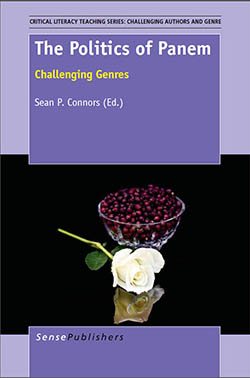FAYETTEVILLE, Ark. – One of Sean Connors’ students introduced him to The Hunger Games trilogy in 2008 and it got him to thinking.
“What can reading The Hunger Games tell us about what it means to be human in the world today?” he wondered.
The result is a new collection of essays about the Hunger Games, written by Connors and several other scholars in the United States and England. The book is coming out just as the third installment of the movie series hits theaters this weekend.
Connors is a University of Arkansas assistant professor of English education.
The Hunger Games is an internationally popular young adult trilogy, that is planned as a series of four movies. It creates a dystopian world, Panem, and an annual government ritual, the Hunger Games, a battle to the death among 12 teenagers. The heroine, Katniss Everdeen, emerges as a hero in a revolution to overthrow the government.
Connors, who was long a scholar as well as a fan of young adult literature, wanted to explore the complex social and political issues author Suzanne Collins raises in the pop culture success. When Connors first heard about The Hunger Games, he was experimenting with teaching young adult literature from the perspective of literary theory while completing his doctorate at Ohio State University.
As he thought more about the trilogy, Connors invited scholars in literacy education and the humanities at several universities to contribute essays to address the question “Does the series merely entertain or does it also instruct?” He asked them to consider, from the standpoint of theory, how both the books and the films can challenge readers and viewers intellectually.
SensePublishers published Connors’ edited collection, The Politics of Panem: Challenging Genres, this fall.
The collection of essays raises several questions that can be explored in secondary and college classrooms:
- How can applying philosophic frameworks to the trilogy deepen our appreciation for the issues it raises?
- What can we learn from fan responses?
- How might adapting the trilogy for film complicate its ability to engage in sharp-edged social criticism?
- From a feminist perspective, how does the trilogy illuminate power relations between men and women?
- What does reading the trilogy from a Marxist perspective reveal about the materialistic basis of culture?
In addition to writing the introduction and editing the book, Connors wrote two chapters: “I Was Watching You, Mockingjay: Surveillance, Tactics and the Limits of Panopticism” and “I Try to Remember Who I Am and Who I Am Not: The Subjugation of Nature and Women in The Hunger Games.”
Connors hopes to offer a special topics course in the fall 2015 semester that will focus specifically on Collins’ trilogy and examine its relationship to other works of dystopian fiction.
Contacts
Sean Connors, assistant professor of English education
College of Education and Health Professions
479-575-2667,
Heidi Wells, content writer and strategist
Global Campus
479-879-8760,
